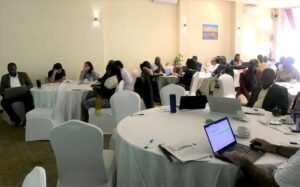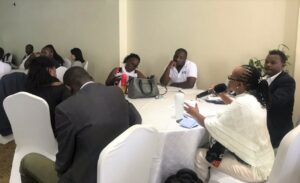The Global Green Growth Institute (GGGI) Uganda, in partnership with the Ministry of Water and Environment (MWE) of Uganda, received funding from Korea International Cooperation Agency (KOICA) to implement a project titled, “Strengthening Solid Waste and Faecal Sludge Management Capacity for Greater Kampala Metropolitan Area (GKMA).” On the 17th of March 2023, the project held a dialog with the Mukono municipality to discuss the design of thr faecal sludge treatment plant (FSTP) in Katikolo, a site objectively selected to serve Mukono and neighboring areas. As a prerequisite to the design of the FSTP, however, feasibility studies needed to be done to establish environmental, social, and economic factors that would affect the implementation of the project and the operation and maintenance once infrastructure is in place.
To further engage and ensure buy-in from stakeholders, an FSTP feasibility study validation workshop was organized by GGGI regarding the project’s outcome 3: Enhanced faecal sludge management in the GKMA. The workshop held on the 17th of March 2023 comes following the completion of feasibility studies on Mukono-Katikolo as the project’s FSTP-designated location. During the workshop, the technical consultancy firm Fichtner Water and Transportation (FWT) presented key findings to the stakeholders. This presentation sought to provide stakeholders with a better understanding of the findings, which gave them a platform to discuss and provide informed recommendations for the most suitable treatment technology for the facility.

Participants at the event.
Findings as presented by Fichtner included.
- Site layout of Mukono-Katikolo, land ownership by the municipality, and proximity to potential markets for products from the treated sludge.
- Faecal sludge generation projections were about 0.5 liters per person per day, and population projections from 2022 to 2050 were about 471,727 and 864,716, respectively.
- Potential by-products from faecal sludge, for example, bio-solid, biofuel, bio-soil, composting biogas, and affluent.
- Considering local context, environment and experience, three (3) treatment processes and technologies for the FSTP included 1) Unplanted sludge drying system, 2) Solar sludge drying system, and 3) Lagoon planted sludge drying system available to be chosen from or integrated.
- Operational models 1) Private sector participation model (PSP), 2) Full government/utility model, 3) Full-scale PPP model.
GGGI in partnership with MWE is working on the technical studies to address the environmental health issues of the Greater Kampala Metropolitan Area (KGMA) which fits well within the Government of Uganda’s “Vision 2040” initiative, which calls for creating a clean and green environment. GGGI is working in line with the guiding principles of the Uganda Green Growth Development Strategy (UGGDS) to support the Government of Uganda in the provision of better and more effective waste management services to Ugandans. Therefore, this workshop was aimed at engaging stakeholders in the establishment of an efficient, and sustainable faecal sludge management system that will serve the Mukono Municipality and the surrounding areas within the GKMA. Following the analysis of treatment processes and technologies, stakeholders from the three presented options chose options 1 (Unplanted sludge drying system) and 2 (Solar sludge drying system) for further consideration and both will be adapted to create a hybrid approach.

Stakeholder feedback during the session.
Subsequently, all participants agreed that Fichtner and GGGI will further investigate options 1 and 2 together as a hybrid option vis-à-vis different operational models with active consultation with National Water and Sewerage Corporation (NWSC) and the Mukono Municipal Council. The aim of this is to select components from each option for the hybrid model facility and benchmark the most effective operational model. Upon completion of the technology selection, GGGI and FWT will present it to the stakeholders for further analysis in order to agree on the design of an appropriate, sustainable facility that will support Mukono Municipality and the surrounding areas within the Greater Kampala Metropolitan Area.
Stakeholders who attended the workshop at Skyz Hotel Naguru: In attendance at the workshop were representatives from the Ministry of Water and Environment (MWE), Korea International Cooperation Agency (KOICA) and Global Green Growth Institute (GGGI), National Water and Sewage Corporation (NWSC), Ministry of Kampala Capital City and Metropolitan Affairs (MoKCC&MA), Kampala Capital City Authority (KCCA), National Planning Authority (NPA), Makerere University, National Environment Management Authority (NEMA), Ministry of Lands, Housing & Urban Development (MoLHUD), Korea Environment Corporation (K-ECO), Fichtner Water & Transportation (FWT), The Association of Uganda Emptiers Ltd (TAOUEL), and Municipality representatives from Mukono, and Kira.